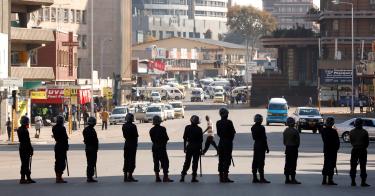A tense calm has come over the streets of Harare, the capital city of Zimbabwe, following a spasm of violence.
On Wednesday, Zimbabwean security forces clashed with supporters of the main political opposition party, the Movement for Democratic Change Alliance, leading to turmoil, deaths, and now a citywide security lockdown.
The unrest follows Zimbabwe’s pivotal election on Monday, the first in nearly four decades that did not feature the tyrant Robert Mugabe on the ballot. In November last year, the Zimbabwean army forced Mugabe out in a coup and installed as president Emmerson Mnangagwa, the man now claiming victory on behalf of the ruling ZANU-PF party.
Some hoped that Mugabe’s ouster meant that freedom would finally return to Zimbabwe, but there was always reason for vigorous skepticism. Mnangagwa is ruthless and brutal. He is a stalwart of the loathsome ZANU-PF system that remained intact after Mugabe’s fall, albeit divided.
Despite some conciliatory rhetoric, Mnangagwa stocked his Cabinet with ZANU-PF cronies and—apparently in recompense for the gift of the presidency—granted Zimbabwe’s corrupt and ruthless military several senior government positions.
Nevertheless, Mnangagwa committed to standing for election this week, and many within the international community rightly viewed the elections as a litmus test for the sincerity of Mnangagwa’s newfound zest for democracy.
We still have only a limited idea of what happened since the generally peaceful polling took place on Monday. MDC Alliance supporters appeared to believe they had won the presidential election, particularly after their candidate, Nelson Chamisa, announced Tuesday that he had taken the voting.
Yet Zimbabwe’s electoral commission declared Wednesday that ZANU-PF won about two-thirds of parliamentary seats. It has also thus far failed to announce the results of the presidential contest, drawing rebuke from some of the international monitoring teams in the country.
The delay, along with other ZANU-PF mischief alleged by MDC Alliance, stirred fear in the opposition that ZANU-PF was stealing the election.
Angry opposition demonstrators then took to the streets and rioted. The Zimbabwean security services responded with tear gas, batons, and then live rounds, killing at least six people.
The military is now patrolling Harare while Zimbabweans await the announcement of the presidential results. If no candidate wins more than 50 percent of the vote, the country will hold a runoff election on Sept. 8.
Drawing firm conclusions in the midst of such a dynamic situation is foolish, but it is also unrealistic to believe that a party as authoritarian as ZANU-PF would allow itself to be voted out of executive power.
It also may be that ZANU-PF did legitimately win the presidential election over an often disunited opposition. Yet many MDC supporters have good reason to believe that the rapacious ZANU-PF—which has stolen previous elections—has done so again here.
Thus, more unrest and suffering seems likely in Zimbabwe before this election standoff reaches a resolution—likely one that will be unjust.
This piece originally appeared in The Daily Signal



